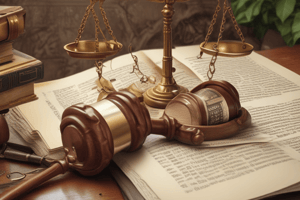Podcast
Questions and Answers
What is the primary purpose of law?
What is the primary purpose of law?
- To determine the guilt or innocence of individuals
- To facilitate international trade
- To evaluate economic performance
- To maintain order, resolve disputes, and protect rights (correct)
Which branch of law focuses on private rights and remedies?
Which branch of law focuses on private rights and remedies?
- International Law
- Administrative Law
- Criminal Law
- Civil Law (correct)
What is the source of law that establishes the fundamental principles of government?
What is the source of law that establishes the fundamental principles of government?
- Common Law
- Constitution (correct)
- Case Law
- Statutes
Which legal principle refers to the power of a court to hear and decide a case?
Which legal principle refers to the power of a court to hear and decide a case?
What does the statute of limitations establish?
What does the statute of limitations establish?
Which branch of law governs the conduct of government agencies?
Which branch of law governs the conduct of government agencies?
What is the focus of property law?
What is the focus of property law?
What is the principle that guarantees fair treatment under the law?
What is the principle that guarantees fair treatment under the law?
What is the primary function of judges within the legal system?
What is the primary function of judges within the legal system?
Which principle ensures that penalties are appropriate for the offense committed?
Which principle ensures that penalties are appropriate for the offense committed?
What distinguishes the common law system from the civil law system?
What distinguishes the common law system from the civil law system?
Which of the following best describes arbitration?
Which of the following best describes arbitration?
What type of reasoning involves applying general rules to specific cases?
What type of reasoning involves applying general rules to specific cases?
Which of the following would be considered an essential characteristic for legal professionals?
Which of the following would be considered an essential characteristic for legal professionals?
What does the concept of 'access to justice' primarily focus on?
What does the concept of 'access to justice' primarily focus on?
In which dispute resolution method does a neutral third party facilitate communication between parties?
In which dispute resolution method does a neutral third party facilitate communication between parties?
Flashcards
What is law?
What is law?
A system of rules and regulations created and enforced through social or governmental institutions to regulate behavior. It serves to maintain order, resolve disputes, and protect citizens' rights. Laws vary across jurisdictions and are constantly evolving.
What is criminal law?
What is criminal law?
Deals with offenses against the state, with penalties like fines, imprisonment, or execution. Examples include murder, theft, and assault.
What is civil law?
What is civil law?
Focuses on private rights and remedies, often involving disputes between individuals or organizations. Examples include contract breaches, property disputes, and negligence.
What is constitutional law?
What is constitutional law?
Signup and view all the flashcards
What is jurisdiction?
What is jurisdiction?
Signup and view all the flashcards
What is due process?
What is due process?
Signup and view all the flashcards
What is a statute of limitations?
What is a statute of limitations?
Signup and view all the flashcards
What is contract law?
What is contract law?
Signup and view all the flashcards
Criminal Procedure
Criminal Procedure
Signup and view all the flashcards
Evidence
Evidence
Signup and view all the flashcards
Common Law System
Common Law System
Signup and view all the flashcards
Civil Law System
Civil Law System
Signup and view all the flashcards
Judges
Judges
Signup and view all the flashcards
Lawyers/Attorneys
Lawyers/Attorneys
Signup and view all the flashcards
Negotiation
Negotiation
Signup and view all the flashcards
Mediation
Mediation
Signup and view all the flashcards
Study Notes
Introduction to Law
- Law is a system of rules and regulations created and enforced through social or governmental institutions to regulate behavior.
- It serves to maintain order, resolve disputes, and protect citizens' rights.
- Laws vary across jurisdictions and are constantly evolving.
Branches of Law
- Criminal Law: Deals with offenses against the state, with penalties like fines, imprisonment, or execution. Examples include murder, theft, and assault.
- Civil Law: Focuses on private rights and remedies, often involving disputes between individuals or organizations. Examples include contract breaches, property disputes, and negligence.
- Constitutional Law: Deals with the interpretation and application of a country's constitution. It sets the fundamental principles and structures of government.
- Administrative Law: Governs the activities of government agencies and the processes by which they operate. This ensures accountability and fairness in government action.
- International Law: Deals with the rules and principles that govern relations between nations. This includes treaties, customs, and general principles of law.
Sources of Law
- Constitutions: The fundamental laws of a nation, establishing the structure of government and the rights of citizens.
- Statutes: Laws enacted by legislative bodies, covering a wide range of topics from criminal codes to tax regulations.
- Case Law: Legal precedents set by courts through rulings on specific cases, shaping interpretations of laws. Decisions from higher courts are binding on lower courts.
- Regulations: Rules and orders created by administrative agencies, having the force of law.
- Common Law: Legal principles and rules derived from judicial precedents and customs, which often evolve over time.
Key Legal Concepts
- Jurisdiction: The power of a court to hear and decide a legal case.
- Due Process: Guarantees individuals fair treatment under the law. Ensures appropriate procedures and safeguards against arbitrary action.
- Statute of Limitations: A time limit established for filing legal actions. After this point, a claim may be too old to pursue.
- Contract Law: Covers the formation, interpretation, and enforcement of agreements.
- Property Law: Focuses on ownership, transfer, and use of property.
- Tort Law: Addresses civil wrongs, including negligence, intentional harm, and product liability.
- Criminal Procedure: Outlines the steps involved in arresting, prosecuting, and trying someone accused of a crime.
- Evidence: Rules governing the admissibility of information presented in court to prove or disprove factual claims.
Legal Systems
- Common Law System: Based on precedents and judge-made law. Judges play a key role in interpreting and applying the law.
- Civil Law System: Relies on codified laws. Judges apply existing statutes and codes without the same level of reliance on prior case rulings.
Legal Professionals
- Judges: Interpret and apply the law impartially.
- Lawyers/Attorneys: Represent clients in legal matters, providing advice and advocacy.
- Paralegals: Support lawyers with legal research and administrative tasks.
- Legal Scholars: Study and advance legal theory and practices.
Legal Reasoning
- Deductive Reasoning: Applying general rules to specific cases.
- Inductive Reasoning: Developing general rules based on specific examples.
- Analogical Reasoning: Comparing similar cases to understand present situations.
Basic Principles of Justice
- Fairness: All individuals should be treated equally under the law.
- Impartiality: Decisions should be made free from bias or prejudice.
- Proportionality: Penalties should be appropriate for the offense committed.
Dispute Resolution Mechanisms
- Negotiation: Parties attempt to settle the dispute through discussion.
- Mediation: A neutral third party facilitates communication and negotiation.
- Arbitration: A neutral third party makes a binding decision.
- Litigation: Formal legal proceedings in court.
Ethics in Law
- Honesty and Integrity: Essential characteristics for legal professionals.
- Confidentiality: Respect for client information.
- Duty of Competence: Maintaining a high level of professional skill and knowledge.
- Conflicting Interests: Recognizing and managing potential conflicts of interest.
Law and Society
- Laws reflect societal values and beliefs.
- Laws continuously adapt to changing societal needs and circumstances.
- Access to justice is a key aspect of a functional and fair society.
Studying That Suits You
Use AI to generate personalized quizzes and flashcards to suit your learning preferences.




